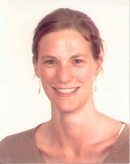Areas of research and interest
Environmental anthropology (especially climate change and human-nature relationships), anthropology of mobility and space perception, urban anthropology, legal anthropology, anthropology of knowledge
Oceania (mostly Micronesia), island worlds (further field research in Hyderabad, India and Alaska)
Contact
Fax:
+49 (0) 89 / 2180 - 9602
Email:
rebecca.hofmann@ethnologie.lmu.de
Rebecca Hofmann studied cultural anthropology, geography and Spanish philology at the University of Freiburg and in Seville, Spain. She graduated in 2008 with her final thesis on competitive resource strategies of Native Alaskans. Afterwards, she undertook research for the German Federal Ministry of Education and Research-funded project on sustainable development of emerging megacities of tomorrow, for which she focused on Hyderabad, India. She continued her research on risk perception and climate change at the Rachel Carson Center for Environment and Society through the Climates of Migration project. Her doctoral thesis ‘Situating Climate Change in Chuuk. Navigating “belonging” through environmental and social transformations in Micronesia’ complemented her archival research with the cultural anthropological study in Chuuk, Federated States of Micronesia. After returning to the institute of cultural and social anthropology in Freiburg for one semester, she now continues her contribution to the anthropology of climate change in Munich. She also focuses on anthropological questions regarding waste and the relationship between cities and rural hinterlands.
Research project
Start: December 2010
Advisor: Prof. Dr. Eveline Dürr
Research Project: Micronesian Perceptions of Nature, Spatiality and Mobility in Changing Climates
The Pacific islands serve the global climate discourse as a symbol for pending humanitarian catastrophe, presented in the “drowning” of the tropical paradises due to rising sea levels and growing storm activity. At the center of the discourse is the loss of “home” (Heimat), judged mostly by the Western value of land. How far this linking of land, identity, and home corresponds to the oceanic perception of space, however, is the central question of the thesis and will be explored with the example of Chuuk, one of the four Federated States of Micronesia.
Relations to nature, the value of land, and the concept of “Heimat” are factors that, in their temporal variations and identity-giving role, open emic approaches to Chuukese constructions of space. Initial findings suggest that local perceptions include interpersonal relations and mobilities; these two factors are brought together in a highly dynamic spatial concept. However, such factors have to be analyzed and understood in the context of prehistoric, historic, and current realities. These realities generate divergent, partly conflicting values that determine the human-nature relationship, with consequences for today's perceptions of nature and environmental behavior.
My thesis will therefore firstly use ethnography and environmental history to delineate how collective and mostly ecological action has turned into relatively individualistic strategies of resource use. This investigation leads us from four colonial powers and evangelization to factual political independence, which, however, shows significant structural dependencies. Such dependencies determine today’s environmental perceptions and, consequently, perceptions of spatiality and mobility in the Micronesian islands. Secondly, I will consider local impacts of global environmental discourses in order to see if, how, and by whom these are absorbed, and how they translate into spatial constructions.
List of publications and presentations
- Publication list to download (320 KByte)


